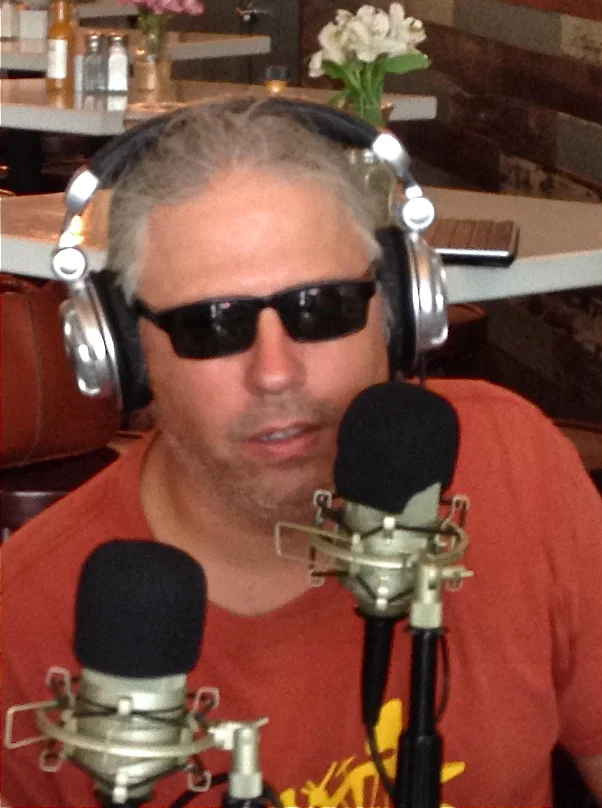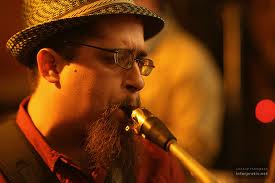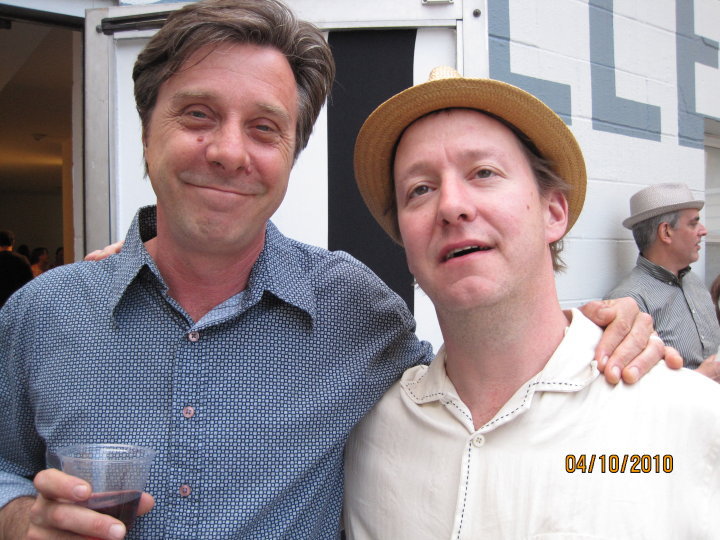Jeff Treffinger(left), Alex Mcmurray(right)Some people provide support. Jeff Treffinger is that sort of person, whether as proprietor and music booker at the legendary Mermaid Lounge, or as record producer, or as musician in groups such as the Geraniums and Tribe Nunzio. Perhaps he learned support from studies in architecture or, his interest in architecture came from a fundamentally supportive facet in his personality.
There is a book by underground icon, Eugene Chadbourne, that so hits the nail on the head about certain pieces of real musical life in bars, that I won't even lend the book out. It has acquired a cult status on my own personal bookshelf. The title of the book is "I hate the man who runs this bar- The Survival Guide For Real Musicians" It's so correct in every way except that The Mermaid Lounge defied the pictures laid out in that book. We loved the men who ran that bar and their contribution and Jeff was one of them. There are many things that go on in the local music scene today that would not be, if it hadn't have been for the initial allowances of their mad "experiments" at the Mermaid. ("Courting" might be better word here than "allowance") Jeff was one of the bar owners, but he did a great deal more around there too.
At any rate, in this near two hour interview with Jeff, he talks about his foregound and background activities that at different times have shaped the New Orleans music scene. And this is not the only direction life has taken him. Here Treffinger, founding member of Tribe Nunzio, describes how he came to be putting a band together in New Orleans at all and, what his purposes were in doing so...or at least his thinking at the time. He tells stories about the accidental discoveries that led him to architecture and how that led him into certain nooks in New Orleans music. He is frank about what he learned and how, and the interesting folks that he collaborates with or has dealt with over the years that have enabled his dealings to be loaded with a delightful, risky creativity.
The Interview
Part 1- Early background in New Jersey; the impact of the Beatles; the guitar; starting in bands and dreams; realities on the Jersey shore; the influence and protection of the older, tougher, musicians he got around early on-discipline, rehearsal, the intellectual component; how Treffinger came to be in New Orleans in 1977 and the allure of the city; fateful snowstorm, achitect of the architect; 1978 to Tulane; meeting Dwight Davis, flautist/Tenor sax; panhandling in the French Quarter; moving away from rock to Chick Corea, Jaco Pastorius, etc; learning further interesting things about Dwight Davis.
Part 2- writing in the early 70's; influential teachers; chord progressions becoming important; what was noticeable about New Orleans music when Treffinger showed up; Astral Project, Tyler's, and James Singleton; the formation of Tribe Nunzio and Cafe Brasil; Nick Sanzenbach; getting The Beaux Arts Ball gig; what kind of songs were being played and its exciting features; the religion of Holden Miller; Jeff's comfort with not being the front man; what it was like getting gigs then; The Economy and meeting Brendan Gallagher, Pat Cronin; Ade Salgado (pre-Cafe Brasil); "Frenchmen St needs some fucking daylight;" Cafe Brasil starts selling booze.
Part 3- the fate of the Economy; more on Brendan Gallagher and his writing; the quick story of the rise and fall of Tribe nunzio, a little on Joe Cabral before The Iguanas; how The Mermaid Lounge started (Nov.1994); meeting 3 or 4 people that can make 10 or 12 bands; the sorts of forces that can create a Mermaid Lounge and why that model isn't around anymore; the Mermaid Lounge calendar- "low brow and high end"; how the Mermaid recording studio came about; Clint's ingenuity; about the ending of the Mermaid and the end of a number of clubs with a certain booking ethic; more on Pat Cronin.
Part 4- How The Geraniums formed; getting others to record their songs; meeting and working with Glen Styler; Alex Mcmurray in The Geraniums; what Jeff is currently up to- writing, upcoming records he's producing, the family album; the changes that Jeff sees in New Orleans since he showed up in the 70's; what happened to older people going to shows too?; succumbing to convention; changes in the art world.



















